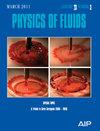Progress in electron energy modeling for plasma flows and discharges
IF 4.1
2区 工程技术
Q1 MECHANICS
引用次数: 0
Abstract
A novel formulation of the electron energy relaxation terms is presented here, which is applicable to plasma flows and discharges wherein the electron temperature could be higher or lower than the gas temperature. It is demonstrated that the electron energy losses due to inelastic collisions can be expressed as a function of only two species-dependent parameters: the reduced electric field and the reduced electron mobility. This formulation is advantageous over previous ones, being simpler to implement and more accurate when experimental data of the reduced electric field and reduced mobility are available. Curve fits to empirical data of these two properties are outlined here for all important air molecular species. The approach accounts for all inelastic electron energy relaxation processes without needing individual cross sections or rates, reducing potential errors associated with independently handling each process. Several test cases are presented to validate the proposed electron energy source terms including reentry plasma flows for which the electron temperature is less than the gas temperature, as well as discharges in which the electron temperature reaches values in excess of 30 eV. In all cases, the agreement with experimental data is observed to be very good to excellent, significantly surpassing prior electron energy models for plasma flows.等离子体流和放电电子能量建模的进展
本文提出了一种新的电子能量弛豫项公式,适用于电子温度高于或低于气体温度的等离子体流和放电。研究表明,非弹性碰撞导致的电子能量损失可以表示为两个依赖于物种的参数的函数:降低的电场和降低的电子迁移率。与之前的公式相比,这种公式的优点是实现起来更简单,而且在有还原电场和还原迁移率实验数据的情况下更精确。这里概述了所有重要空气分子种类的这两个特性与经验数据的曲线拟合。该方法考虑了所有非弹性电子能量弛豫过程,不需要单独的截面或速率,从而减少了独立处理每个过程可能产生的误差。本文提出了几个测试案例来验证所提出的电子能量源术语,包括电子温度低于气体温度的再入等离子体流,以及电子温度超过 30 eV 的放电。在所有情况下,与实验数据的一致性都非常好,甚至非常出色,大大超过了之前的等离子体流电子能量模型。
本文章由计算机程序翻译,如有差异,请以英文原文为准。
求助全文
约1分钟内获得全文
求助全文
来源期刊

Physics of Fluids
物理-力学
CiteScore
6.50
自引率
41.30%
发文量
2063
审稿时长
2.6 months
期刊介绍:
Physics of Fluids (PoF) is a preeminent journal devoted to publishing original theoretical, computational, and experimental contributions to the understanding of the dynamics of gases, liquids, and complex or multiphase fluids. Topics published in PoF are diverse and reflect the most important subjects in fluid dynamics, including, but not limited to:
-Acoustics
-Aerospace and aeronautical flow
-Astrophysical flow
-Biofluid mechanics
-Cavitation and cavitating flows
-Combustion flows
-Complex fluids
-Compressible flow
-Computational fluid dynamics
-Contact lines
-Continuum mechanics
-Convection
-Cryogenic flow
-Droplets
-Electrical and magnetic effects in fluid flow
-Foam, bubble, and film mechanics
-Flow control
-Flow instability and transition
-Flow orientation and anisotropy
-Flows with other transport phenomena
-Flows with complex boundary conditions
-Flow visualization
-Fluid mechanics
-Fluid physical properties
-Fluid–structure interactions
-Free surface flows
-Geophysical flow
-Interfacial flow
-Knudsen flow
-Laminar flow
-Liquid crystals
-Mathematics of fluids
-Micro- and nanofluid mechanics
-Mixing
-Molecular theory
-Nanofluidics
-Particulate, multiphase, and granular flow
-Processing flows
-Relativistic fluid mechanics
-Rotating flows
-Shock wave phenomena
-Soft matter
-Stratified flows
-Supercritical fluids
-Superfluidity
-Thermodynamics of flow systems
-Transonic flow
-Turbulent flow
-Viscous and non-Newtonian flow
-Viscoelasticity
-Vortex dynamics
-Waves
文献相关原料
| 公司名称 | 产品信息 | 采购帮参考价格 |
|---|
 求助内容:
求助内容: 应助结果提醒方式:
应助结果提醒方式:


